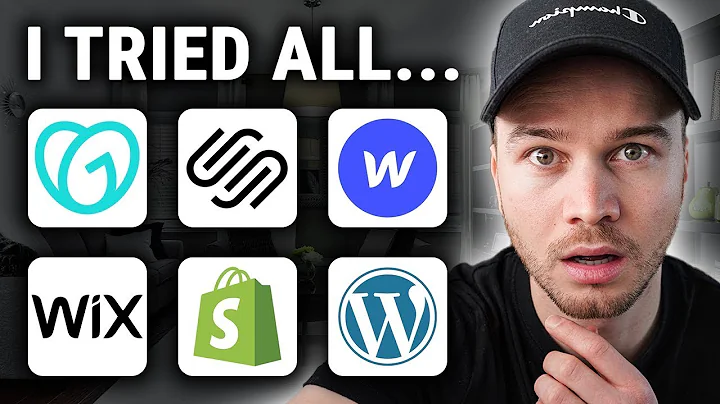Shopify's Ecosystem Expansion: Intensifying Competition with Amazon
Table of Contents
- Introduction
- Shopify's Ecosystem Expansion
- The FTC's Focus on Amazon
- Competition from Upstarts and Retail Players
- Shopify's Partnership with FAIR
- Shopify's Collaborations with Start-ups
- Access to Shopify's Merchant Network
- Shopify's Growth and Market Cap
- Challenges Faced by Shopify
- Comparison between Shopify and Amazon
- The Role of Regulators in Evaluating Deals
- What is FAIR?
- B2B Retail Marketplace and its Size
- Conclusion
Shopify Expands Ecosystem, Poses Competition for Amazon
Introduction
In today's rapidly evolving e-commerce landscape, Shopify has announced an exciting new partnership aimed at expanding its ecosystem. This move is set to intensify the competition for e-commerce giant Amazon. With the FTC recently targeting Amazon for operating an illegal monopoly, it is clear that Amazon is facing increased competition from both upstart companies like Shopify and established players such as Walmart. In this article, we will delve into the details of Shopify's ecosystem expansion and its implications for the e-commerce industry.
Shopify's Ecosystem Expansion
Just one day after the FTC's action against Amazon, Shopify has made a strategic move to further solidify itself as a viable alternative to the e-commerce behemoth. This expansion comes in the form of an investment in the wholesale platform, FAIR. While the specific details of the deal have not been disclosed, it is clear that Shopify's technology will be adopted by FAIR, benefiting their customers and strengthening Shopify's position in the market. This collaboration adds to a string of partnerships between Shopify and various start-ups working with sellers, including notable names like Klaviyo, Affirm, Stripe, and Flexport.
The FTC's Focus on Amazon
The recent FTC investigation into Amazon's alleged anti-competitive practices has shed light on the challenges faced by the retail giant. Shopify's decision to partner with FAIR underscores the retailers' desire to compete with Amazon on a different playing field. It is not just about offering the lowest prices or the widest variety of products. Successful retailers understand the importance of curating unique inventories and providing memorable experiences for consumers. By partnering with Shopify, retailers gain access to a vast network of over 2 million merchants, while Shopify expands its array of services and secures equity in partner companies.
Competition from Upstarts and Retail Players
Shopify's ecosystem expansion signifies a growing trend of businesses seeking alternatives to Amazon. While the e-commerce giant has built a formidable platform, companies like Shopify are challenging the notion that competing against Amazon is insurmountable. Walmart's entry into the e-commerce space has also posed a significant threat to Amazon's dominance. With Walmart's well-capitalized resources and established brand recognition, it has become a prominent player in the e-commerce arena. This shift in the competitive landscape highlights the need for Amazon to navigate its way through intensifying competition.
Shopify's Partnership with FAIR
The partnership between Shopify and FAIR is a testament to the value Shopify offers its customers. FAIR CEO Max Rhone explains that their retailers thrive not by offering the lowest prices or the largest assortments, but by emphasizing the uniqueness of their inventory and the memorable experiences they provide to customers. By collaborating with Shopify, FAIR gains access to a vast network of sellers who align with their business model. This strategic partnership allows Shopify to strengthen its position as an alternative to Amazon and reinforces its commitment to supporting retailers in creating exceptional consumer experiences.
Shopify's Collaborations with Start-ups
Shopify's track record of successful collaborations with start-ups is a testament to its ability to foster innovation within its ecosystem. Partnerships with companies like Klaviyo, Affirm, Stripe, and Flexport have allowed Shopify to offer a comprehensive suite of services to its merchants. The integration of these services into its platform empowers sellers to navigate the complexities of the e-commerce landscape effectively. Furthermore, these collaborations have granted Shopify valuable equity stakes in partner companies such as Klaviyo, enhancing its financial standing and contributing to its continued growth.
Access to Shopify's Merchant Network
One of the key advantages of partnering with Shopify is gaining access to its extensive network of over 2 million merchants. This network represents a significant opportunity for start-ups and established companies alike to connect with a vast customer base. By leveraging Shopify's infrastructure, companies can tap into a ready-made ecosystem that supports business growth and customer acquisition. This access to a diverse range of sellers sets Shopify apart from Amazon, providing a more personalized and curated shopping experience for consumers.
Shopify's Growth and Market Cap
Over the years, Shopify has experienced remarkable growth, with its market capitalization now exceeding $65 billion. This growth can be attributed to Shopify's commitment to expanding its ecosystem, offering funding to merchants, and providing essential tools for marketing and advertising. However, it is worth noting that building a platform to compete with Amazon has not come without its challenges. Shopify spent years creating its own logistics network, only to offload it recently to Flexport. Despite these challenges, Shopify has proven its ability to adapt and thrive in the fiercely competitive e-commerce industry.
Challenges Faced by Shopify
While Shopify has achieved impressive success, it still faces challenges in its quest to compete with Amazon. Amazon's "Buy with Prime" feature, as well as its extensive logistics network, pose significant obstacles for Shopify. Amazon's ability to quickly deliver products to consumers has propelled it to the top of the e-commerce hierarchy. Shopify, on the other hand, must rely on strategic partnerships and continuous innovation to remain a strong contender in the market. The ongoing scrutiny of Amazon's business practices by regulators further adds complexities to the competitive landscape that Shopify must navigate.
Comparison between Shopify and Amazon
Shopify's expansion and partnerships with various companies demonstrate the potential for healthy competition in the e-commerce industry. While Amazon has undeniably built a powerful platform, Shopify offers a distinct alternative, especially for retailers looking to stand out based on inventory uniqueness and memorable experiences. Shopify's commitment to supporting its retailers and providing them with the tools they need for success sets it apart from Amazon's approach. The ongoing antitrust case and regulatory discussions will shed light on the intricacies of the competitive dynamics between these two e-commerce giants.
The Role of Regulators in Evaluating Deals
The deal between Shopify and FAIR exemplifies the complexities that regulators and judges must navigate when evaluating the impact of partnerships and collaborations. The surge in strategic alliances in the e-commerce space further complicates the argument that Amazon leverages its dominance to stifle competition. While the intentions behind these deals may be genuine, regulators and judges have the responsibility to scrutinize their implications thoroughly. The outcome of such evaluations will shape the e-commerce landscape and set precedents for future collaborations in the industry.
What is FAIR?
FAIR is a B2B retail marketplace that serves as a wholesaler, allowing merchants to source a wide range of products that they can then sell to consumers. FAIR's model differs from Shopify and Amazon, both of which focus primarily on business-to-consumer (B2C) transactions. With a valuation of nearly $12 billion, FAIR has established itself as a significant player in the retail marketplace. The partnership between Shopify and FAIR unlocks new opportunities for retailers to access unique products and cater to the demands of their customer base.
B2B Retail Marketplace and its Size
The B2B retail marketplace, represented by FAIR, occupies a crucial position in the e-commerce ecosystem. By enabling merchants to source products from wholesalers, B2B marketplaces like FAIR fuel the growth of B2C transactions. This segment of the retail industry was valued at nearly $12 billion, highlighting its significance in the broader e-commerce landscape. As merchants increasingly recognize the potential of B2B marketplaces, this sector is expected to grow further, empowering retailers to offer diverse products and meet the evolving demands of consumers.
Conclusion
Shopify's continued expansion and strategic partnerships emphasize its determination to compete with Amazon and reshape the e-commerce landscape. By offering retailers a platform to curate unique inventories and create memorable consumer experiences, Shopify has carved out a niche in the industry. The collaborations with FAIR and other start-ups further enhance Shopify's value proposition while providing additional services and opportunities for growth. As competition intensifies, regulators and judges play a crucial role in ensuring a fair playing field for all participants in the e-commerce industry.
Highlights
- Shopify's partnership with FAIR expands its ecosystem and intensifies competition with Amazon.
- The FTC's investigation into Amazon's alleged anti-competitive practices has brought increased focus on alternatives like Shopify.
- Shopify's collaborations with start-ups, such as Klaviyo and Affirm, have strengthened its market position and offered a diverse range of services to merchants.
- Access to Shopify's extensive network of over 2 million merchants gives companies the opportunity to connect with a vast customer base.
- Shopify's growth and market cap demonstrate its ability to adapt and thrive in the highly competitive e-commerce industry.
- Challenges such as Amazon's logistics network and the ongoing antitrust case pose obstacles for Shopify's quest to compete with Amazon.
- The partnership between Shopify and FAIR exemplifies the complexities regulators face when evaluating collaborations in the e-commerce industry.
- FAIR, a B2B retail marketplace, offers merchants the ability to source unique products from wholesalers.
- The B2B retail marketplace represents a significant segment of the e-commerce industry and has the potential for further growth.


















